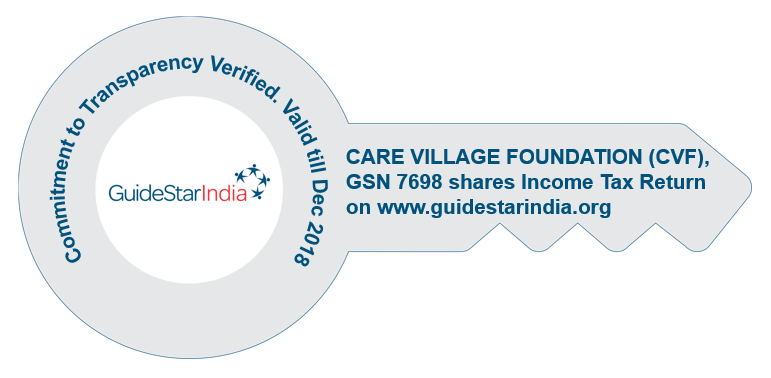
AWARENESS
Women in our society have been held back in more ways than one cutting them off from any form of education, media, or any other self-growth and self -nurturing activities. Knowledge is power and therefore, we have taken this to be the first step to empower women by nurturing them with information and awareness on various provisions that they claim for self-growth.

IMPLEMENTATION
Our next step in women empowerment is the implementation of numerous government schemes for women which have been formulated and enforced. For eg. the Mahila Panchayat scheme developed by the Delhi Commission for Women which has been successfully implemented at P.S., Mundka, J.J. Colony Bakkarwala, West Delhi and implemented by CVF.
The wreath symbolizes a woman’s strength and endurance. This can be seen through centuries how women have not only endured hardships but they have also emerged strengthened and victorious against all odds. The flamingo on the other hand, stands for being balanced and resourceful which is how women have always been. They balance being a daughter, mother, wife, a professional basically, being a woman is the epitome of balancing multiple roles which they have done over centuries and continue till today in contemporary forms.
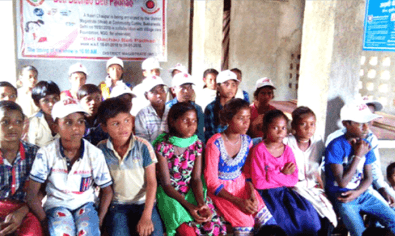
EDUCATION
Goal 4 under the United Nations Sustainable Development Goals 2030 is Education which is a standalone goal and it has included a broader focus on inclusion, equity and gender equality in education. The targets and means of implementation of this goal also include lifelong learning opportunities for all. The outcome targets of this goal include:
(i) By 2030, ensure that all girls and boys complete free, equitable and quality primary and secondary education leading to relevant and effective learning outcomes with provision of 12 years of free, publicly-funded, inclusive, equitable quality primary and secondary education
– of which at least nine years are compulsory, leading to relevant learning outcomes – should be ensured for all, without discrimination.
(ii) By 2030, ensure that all girls and boys have access to quality early childhood development, care and pre-primary education so that they are ready for primary education with provision of at least one year of free and compulsory quality pre-primary education is encouraged, to be delivered by well-trained educators, as well as that of early childhood development and care.
According to the 2011 census, in Delhi the literacy rate is 86.3 per cent out of which the male literacy rate is 91 per cent whereas the female literacy rate is only 80.9 per cent which is close to that national literacy rate of 74.04 per cent. This shows that female literacy continues to remain a major challenge in the national capital. This phenomenon can be attributed to multiple factors that are socio-economic in nature as well as cultural and religious.
Female literacy has a direct impact on the development of the economy among other things like infant mortality rate, malnutrition etc. It has also been observed that female literacy is higher in urban areas as compared to rural areas of states like Rajasthan, U.P. and Bihar which are also some of the most populated states of our country. Rajasthan registered female literacy at the rate of as low as 52.7 per cent. These statistics mainly show us that we still have a long way to go to achieve 100 per cent literacy as has been envisioned by SDG 2030 as well as our national aspiration of a bright and shining India. We as citizens of this country have a duty towards our fellow citizens to ensure that everyone (men, women, children, transgender) get a fair opportunity for growth and development. And education is the primary means to ensure the achievement of the growth and development that we seek and aspire for.
Therefore, recognizing this crucial goal, we at Care Village Foundation have promoted literacy and education for over a decade now through various awareness programmes, seminars, interactive sessions so that the beneficiaries realize the importance of sending both girls and boys to school and we have also through various collaborations brought in the means to enable children from poor socio-economic backgrounds to go to school. On 14th August 2018, CVF for the first time with great support from our donors was able set up “SAMRIDHI” – A Resource Center for migrant children in J.J. Colony, Bakkarwala, West Delhi. SAMRIDHI will be a beacon of hope for the hundreds of children of migrants living in the area at the Delhi Development Authority construction site. CVF at a grass-root level is relentlessly taking efforts to implement many more such programmes for the purpose of promoting education among the underprivileged population and we could do a lot more with your support in a small or big way for these undeserved children.
NON-FORMAL EDUCATION
We at CVF focus on providing mostly non-formal education to the underprivileged children. Non- formal learning is an organized form of learning which may or may not be guided by a formal curriculum. This type of education may be led by a qualified teacher or by a leader with more experience. Non-formal learning is highly enriching and builds an individual’s skills and capacities. A learner’s interest and motivation is a driving force behind their participation. Because of this reason, it is often considered more engaging as compared to formal learning.
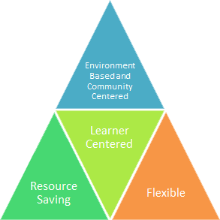
Non-formal learning some of the same aspects of formal learning, but typically manifest as short term, voluntary programs outside of the framework of traditional educational institutions. Non-formal learning is usually offered by a wide variety of organizations, including government services, youth organizations, voluntary and non-profit organizations and tertiary education. The characteristics of non-formal method of teaching is environment based, community related, flexible, learner centered and resource saving. This characteristics are important as it allows a childrenfrom diverse backgrounds to benefit from the curriculum. CVF through its numerous programmes has also promoted the government’s progressive scheme of Beti Bachao Beti Padhao to help people understand that the government is raking legit efforts to ensure education of the girl child and this will go a long way in changing the rigid mindset of socio-culturally backward Indian societies.
SAMRIDHI – SCHOOL FOR THE UNDERSERVED CHILDREN
Inaugurated on 14th August 2018 by Sh. Vinod Kumar Meena, Secretary – DLSA (Wes), Sh. Sandeep Kumar, Secretary – DLSA (Central) and Mr. Sunil Kumar Gupta, Lead District Manager at Canara Bank.
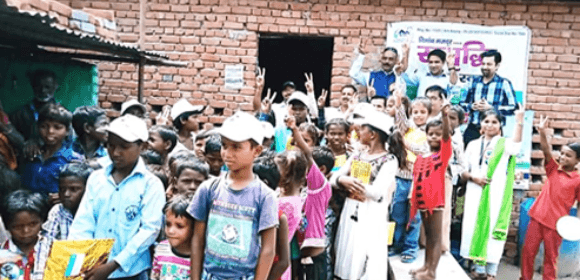

LET’S EDUCATE – LET’S LIGHT UP THE WORLD
EDUCATION IS NOT PREPARATION FOR LIFE; EDUCATION IS LIFE ITSELF
– JOHN DEWEY -
Education is the most basic criteria or the foundation stone to a developed society. Education does not have to be pure rote learning of theorems and literature, but one that focuses on the development of the mind. It is one that helps an individual to achieve their maximum potential within a given set of resources and shape him/her into a well-rounded human being. Education is one that teaches its student to not just take from the society but also give back to that same society, sustain the society and contribute to its development. Values are an inseparable part of a good education and must be instilled in students minds but also they must be given the freedom to exercise those values in their own distinct manner. Any right value instilled in the right manner in a child will not go misunderstood or misinterpreted. A holistic education will ensure that children do not turn into money minting robots but humans that light up the lives of other humans one or the other.
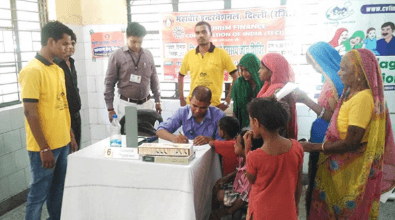
HEALTH
We have very often heard that India is a country of ironies. And this irony is very much seen in the health sector as well. On one side we have people coming from all over the world to seek treatment in India but on the other side we have people dying due to low quality, sub-standard or insufficient healthcare services. The most recent, glaring example of this is the Gorakhpur hospital tragedy where 30 children died within 48 hours in BRD Medical College, Goraphpur, Uttar Pradesh after oxygen supply was disrupted.
Other than this, people sleeping on the floor in government hospitals and shortage of beds is a common sight and common knowledge, which we as a country with passage of time have become indifferent to such plight of the less advantaged. In addition to shortage of healthcare resources and professionals there is poor awareness on various crucial and common health issues which can be prevented at the grassroot level. In the recent past we have seen a surge in AIDS awareness programmes, Cancer awareness, mental health awareness, polio vaccination etc. which is essential to safeguard the human resource of our country and the overall economic development. We at Care Village Foundation have extensive and numerous health programmes in the form of awareness sessions, seminars, annual free health camps, weekly eye check in collaboration with AIIMS Delhi and many other government and corporate supporters.
CERTIFICATES
-
Registration Certificate
-
12A Certificate
-
80G Certificate
-
FCRA Certificate
